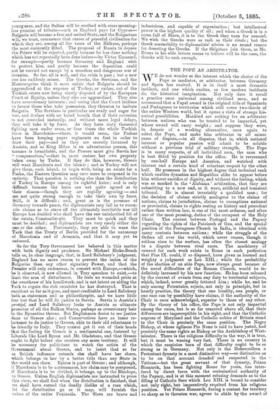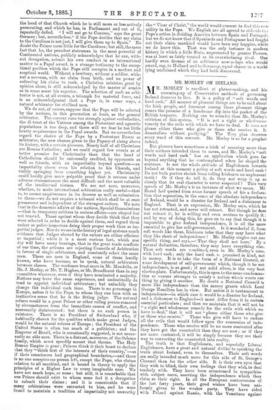THE POPE AS ARBITRATOR.
WE do not wonder at the interest which the choice of the Pope as mediator, or arbitrator, between Germany and Spain has excited. It is in itself a most dramatic incident, and one which excites, as few modern incidents do, the historical imagination. Not only does it recall a practice once universal among civilised men, and so reverenced that a Papal award is the original title of Spaniards and Portuguese to territories which still cover two-thirds of the entire Western world, but it opens a vista of strange his- torical possibilities. Mankind are seeking for an arbitrator between nations who can be trusted to be impartial, yet whose award will carry weight ; and suppose they were, in despair of a working alternative, once again to select the Pope, and make him arbitrator in all minor cases of dispute,—in all disputes, that is, which national interest or popular passion will admit to be soluble without a previous trial of military strength. The Pope is in many respects, of all individual men, the man who is best fitted by position for the office. He is reverenced by one-half Europe and America, and watched with interest and a certain kind of reluctant respect by the other half. He possesses in the highest degree that technical rank which enables dynasties and Republics alike to appear before him without sacrifice of dignity, and without the feeling, which was so marked in the ' Alabama ' arbitration, that they are submitting to a new and, as it were, artificial and transient tribunal. He is almost invariably a qualified man ; for the decision of claims strictly analogous to the claims of nations, claims to jurisdiction, claims to exemptions national or provincial, claims to rights resting on history and precedent rather than written law, is one of the most arduous, and often one of the most pressing, duties of the occupant of the Holy Chair. The contest between Portugal and the Papacy regarding the rights of the Patriarch of Goa, and the special position of the Portuguese Church in India, is identical with many contests between nations ; while the straggle of the Orders all over the world, which never ceases, though it seldom rises to the surface, has often the closest analogy to a dispute between rival races. The machinery of counsel for such work exists in Rome in such perfection that Pius IX. could, if so disposed, have given as learned and weighty a judgment as Leo XIII. ; while the probability of the election of an able Pope, now always great because of the novel difficulties of the Roman Church, would be in- definitely increased by his new function. He has been released by the current of events from any duty to territorial subjects, which, indeed, never greatly fettered him ; while he, and he only among Potentates, rejects, not only in principle, but in hourly practice, the theory that one locality, one people, or one race can by possibility have claims, if the authority of the Chair is once acknowledged, superior to those of any other. By the theory of his office, the Pope is not only impartial among the races, but is so far removed above all, that their differences are imperceptible in his sight, and that the Catholic negroes of Maryland and the Catholic nobles of Britain stand to the Chair in precisely the same position. The Negro Bishop, at whose ugliness Pio Nono is said to have jested, had precisely the same rights as Bishop as the Archbishop of West- minster. There is the religious difficulty in the way, it is true, but it must be waning very fast. There is no country in which the suspicion born of that difficulty ought to be so strong as in Germany. Not only is the Hohenzollern a Protestant dynasty in a most distinctive way—so distinctive as to be on that account dreaded- and suspected in the Vatican—bat the great servant of that dynasty, Prince Bismarck, has been fighting Rome for years, has inter- fered by direct force with the ecclesiastical authority of the Papacy, and is at this moment refusing demands as to the filling of Catholic Sees which Leo XIII. is bound to consider not only right, but imperatively required from his religious position. Yet Prince Bismarck, during a contest for territory so sharp as to threaten war, agrees to abide by the award of
the head of that Church which he is still more or less actively persecuting, and which he has, in Parliament and out of it, repeatedly defied. "I will not go to Canossa," says the great German ; but, nevertheless," if the Pope decides that my claim to the Carolines is not just, I will give them up to Spain." No doubt the Prince cares little for the Carolines ; but still, the mere fact that he, the proudest statesman in the most powerful of Continental nations, publicly acknowledges that he can, with- out derogation, submit his own conduct in an international matter to a Papal award, is a strange testimony to the excep- tional position which the Pope still occupies in a modern and sceptical world. Without a territory, without a soldier, with- out a revenue, with no claim from birth, and no power of enforcing his claim to rank, a Christian minister, great by opinion alone, is still acknowledged by the master of armies as in some sense his superior. The selection of such an arbi- trator is not, at all events, a triumph for material force, and is an acknowledgment that a Pope is, in some ways, a natural arbitrator for civilised men.
We do not, of course, suppose that the Pope will be selected by the nations, in this generation at least, as the general arbitrator. The current runs too strongly against ecclesiastics, the di-trust of the Vatican among the Protestant and agnostic populations is too deep, and there will we fear be too little hearty acquiescence in the Papal awards. But we nevertheless regard the choice of the Pope by a Protestant Power as arbitrator, the new chance given to the Papacy of rising above its history, with a certain pleasure. Nearly half of all Christians are Roman Catholics ; and we could regard few events as of better promise for Christianity than that the head of Catholicism should be universally credited, by opponents as well as friends, with an impartiality beyond question—an impartiality above even his relation to his Church, and visibly springing from something higher yet. Christianity could hardly give more palpable proof that it secures under adverse circumstances the most difficult and the most valuable of the intellectual virtues. We are not sure, moreover, whether, to make international arbitration really useful—that is, to secure acquiescence in its decrees as well as submission to them—we do not require a tribunal which shall be at once permanent and independent of the strongest suitors. We note that in the domestic affairs of the nations, Special Commissions —that is, temporary arbiters in serious affairs—are obeyed but not trusted. Those against whom they decide think that they were selected in order to decide against them, and regard them rather as police inspectors doing their proper work than as im- partial judges. Nor do we see in the history of legal systems much evidence that Judges elected by the suitors are either efficient or impartial ; while it is a most curious fact, which one day will have many bearings, that in the great trade conflicts of our time, the artisans are rejecting Councils of Arbitration in favour of single arbitrators, and constantly select the same men. There are men in England, some of them hardly known, who have become, so to speak, natural arbitrators between classes. The workmen trust more in Mr. Mundella, or Mr. J. Morley, or Mr. T. Hughes, or Mr. Broadhurst than in any committee whatever, even if they have nominated a majority. Nations may have the same experience, and undoubtedly do tend to appoint individual arbitrators ; but unluckily they change the individual each time. There is no personage in Europe, unless it be the Pope, to whom they can turn with an instinctive sense that he is the fitting judge. The natural referee would be a great Prince or other ruling person removed by circumstances from the immediate causes of conflict, and necessarily disinterested ; but there is no such person in existence. There is no President of Switzerland who, if habitually chosen for the qualities which make great Judges, would be the natural referee of Europe ; the President of the United States is often too much of a politician ; and the Emperor of Brazil, who is occasionally suggested, is not neces- sarily an able man. There is a distrust, moreover, of the Orleans family, which must speedily mount that throne. The Holy Roman Empire is gone ; Princes think it their boast to declare that they "think first of the interests of their country,"—as if their consciences had geographical boundaries,—and there is no one conspicuous person left, except the Pope, who claims relation to all mankind, and is bound in theory to apply the principles of a Higher Law to every imaginable case. We have not much hope, or none ; but still, it is remarkable that one Prince should exist to whom none feel it a derogation to submit their claims ; and it is conceivable that if many arbitrations were entrusted to him, and he were found to maintain a tradition of impartiality not unworthy the" Vicar of Christ," the world would consent to find this new utility in the Pope. We English are all agreed to ridicule ths Pope's action in dividing America between Spain and Portugal; but we do not know that if Spaniards and Portuguese had fought out their claim mankind would have been any happier, while we do know this. That was the only instance in modern history in which a little State, unprotected by greater Powers, was at least as fairly treated as its overwhelming rival. One hardly even dreams of an arbitrator now-a-days who would award, say, to Holland and to Germany, equal shares in a world lying unclaimed which they had both discovered.















































 Previous page
Previous page